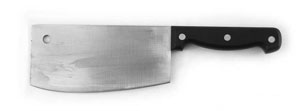
The Borscht Ultimatum
by Ari Levaux
In the dining car at the end of the train, techno music was pumping as the train rocked its way through the Siberian darkness. Two babes in red lipstick sat at a table playing cards and smoking. They didn’t seem to notice when the waiter threatened to break my leg.
“Mafia,” he said, as he moved his hand in a slicing motion across his leg. I noticed the cook standing in the doorway, fondling his cleaver. If anyone’s leg should have been broken it was that cook’s, thanks to the miserable excuse for borscht he’d just prepared.
I should have listened to my gut when I first sat down and the large waitress took my order with a smile that was both sympathetic and scary. I never saw her again. A stone-faced man brought me a bowl of faintly purple water, in which pieces of sliced hot dog floated among a few shards of cabbage. Then he brought the bill for $25.
 I pointed out that the menu had advertised it for $3. The man, with gestures and broken English, explained that I also owed for silverware, plates, salt, pepper and napkins. When I protested, he mimed the leg break, as the chef double-checked his knife. I caved to the borscht ultimatum, paid the money and bailed. The next morning the dining car was gone.
I pointed out that the menu had advertised it for $3. The man, with gestures and broken English, explained that I also owed for silverware, plates, salt, pepper and napkins. When I protested, he mimed the leg break, as the chef double-checked his knife. I caved to the borscht ultimatum, paid the money and bailed. The next morning the dining car was gone.
At the time, I wasn’t very many bowls into my borscht-eating career, but I’d had enough to know that this was the worst ever. The only reason it even qualified was because the term is so general, and refers to a broad category of Eastern European soups made with beet, tomato, cabbage, or all three.
While considered synonymous with “beet soup,” borscht can be made with cabbage, tomato or sorrel as the main ingredients, to name a few. Borscht is served either hot and cold, and often with a dollop of sour cream. Or, as I learned a few days later, on the shore of Lake Baikal, a dollop of mayo.
Whatever it’s made of or served with, at the end of the day borscht remains an all-star comfort food. And like many other regional comfort foods, such as ratatouille, polenta and coq au vin, borscht comes from bucolic origins and wears the “peasant food” banner with dignity and grace. Borscht is proof that a culinary masterpiece can be made from the most humble ingredients.
My mom, born of Russian immigrants, makes a fantastic borscht. But my favorite (sorry mom) is based on a recipe in Joy of Cooking. It’s a great fall recipe, as many of the ingredients are in season. The best meat to use is something tough, preferably with bone attached, that you can braise for hours, yielding a tasty broth.
Ultimate Borscht
If using a tough cut of meat, brown it under the broiler and braise in a covered baking dish at 350 until spoon-tender, never letting the water level drop below half. Reserve the jus and add it to the soup when the time comes. When the meat has cooled, pull apart into small pieces.
If using a softer cut of meat, cut into cubes, and brown in oil in the bottom of a soup pot or Dutch oven.
Then turn your attention to the beets. Trim a pound, slice or cut into quarters, and place in a baking dish. Sprinkle with salt and pepper, put them in the oven with the meat until they’re soft. Let them cool and set them aside. Pull off the skins if you wish.
If you braised meat, add it to a thick-bottomed pan along with a few tablespoons of olive oil, and cook a few minutes on medium heat. If you pan-browned tender meat, you’re already there. Add the chopped onion and cook with the meat. Add garlic and tomatoes and cook a few more minutes. Add a quart of stock or the jus. I like chicken – homemade or “Better than Bouillon” brand. Add carrots and celery, and cook for half an hour. Adjust water as needed, then add beets, cabbage, lemon/lime, garlic powder and vinegar.
Season with salt and pepper, simmer for 15 minutes, and garnish with dill or chervil. Now open a jar of mayo, throwing the cap over your shoulder like they do in Siberia (they do the same thing with vodka caps). Add a spoonful of mayo (or sour cream) and allow it to float like an iceberg in your bowl, slowly turning the contents from red to pink. This is borscht worth $25 a bowl. But if you disagree, at least nobody will break your legs.
In this week's issue...
- December 18, 2025
- Let it snow
Although ski areas across the West have taken a hit, there’s still hope
- December 18, 2025
- Look, but don't take
Lessons in pottery theft – and remorse – from SW Colorado
- December 11, 2025
- Big plans
Whole Foods, 270 apartments could be coming to Durango Mall parcel
